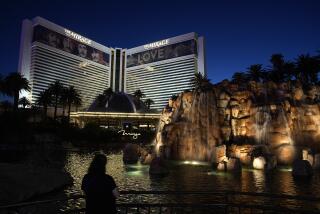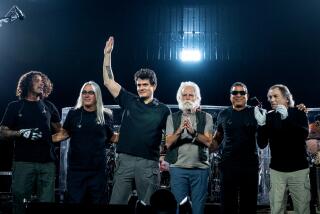Las Vegas Not Taking Chances on Y2K Glitches
- Share via
LAS VEGAS — Bud Eyre wanders through the Stardust casino, his ears attuned to the music of chance--the rhythmic clank of coins dropping in the slot machines, the restless rattle of the roulette wheel.
Nowadays, though, Eyre is anything but a gambler. He’s the computer trouble-shooter for Boyd Gaming, which owns seven casinos nationwide. And it’s his job to see that the company’s vast computer network continues to run glitch-free the morning of Jan. 1, 2000, the dawn of a new gambling millennium.
While he slowly grows confident that his casinos won’t be crippled by any computer bug, the 38-year-old Eyre has left little to chance. No detail has been too small since he began his examination of Boyd’s computer-driven operations. He has checked everything from how the coins are counted to how the surveillance cameras operate to the working of the 1.2 million light bulbs adorning the Stardust’s gigantic Strip-side marquee.
Sometimes he plays hardball. Like when he ordered two casino bosses to buy $70,000 telephone call accounting systems after the old ones proved Y2K-deficient. Eyre says the only difference between a Y2K analyst and a terrorist is that “you can negotiate with a terrorist.”
While Las Vegas has many of the same Y2K concerns as most cities, come New Year’s Eve the isolated gambling mecca will have something the others won’t: a weekend invasion of an estimated 500,000 to 750,000 visitors.
Travel agents call Las Vegas the nation’s most frequently requested millennium destination, host to a celebration expected to attract more people than any other destination in the U.S. except New York City’s Times Square. The influx will pack more people into the city than at any time in its history, exaggerating any fallout from Y2K computer problems.
Using their own Y2K and security advisory committees, Las Vegas police have mapped out contingency plans to cover everything from how far apart to space the 1,000 officers who will patrol the two-mile-long Strip to greasing area telephone poles as a way to discourage drunk revelers from scaling them.
Police have practiced handling such worst-case scenarios as a bomb set off on the Strip, an electrical system collapse and an airport shutdown that provokes a riot outside casinos.
Guarding against domino-effect power outages, Nevada Power & Light will minimize transfers from the Western states power grid, relying instead on locally produced electricity to satisfy the city’s voracious appetite for power.
And for the first time in history, the city’s 50 reservoirs will be filled to capacity for the millennium weekend--1 billion gallons of water on hand to provide a four-day grace period for working out any computer-generated supply problems.
The floors of casinos like the Startdust are ground zero of the city’s millennium preparations. But months of scrutiny have persuaded Eyre that his portion of the city’s $60-billion gambling industry won’t be brought to its knees on New Year’s Eve.
Instead of one major migraine, he expects to spend New Year’s Day dealing with a “thousand little headaches” that will probably go unnoticed by the average gambler.
Eyre is a Las Vegas insider with a foot in two increasingly congruent worlds: He knows computers, and two decades with Boyd have taught him the gaming industry. After spending years as “a technological hit man,” going from project to project, the company in December asked him to handle its Y2K compliance effort.
The task was so daunting, the stakes so high, that a nervous Eyre started smoking again after a 10-year hiatus. With a budget of nearly $10 million, his job was to examine the 11 powerful mid-range computers and 30 server systems that handle the casino, hotel and restaurant operations, as well as the 2,000 personal computers used throughout the Boyd Gaming empire.
For five months, he has delved into the casino’s computer nether-world. Still, he knows that the smallest thing could cause problems come New Year’s, such as some 20-year-old computer chip in a sprinkler system that could malfunction and flood one of the casinos.
“We didn’t know what to expect,” Eyre said. “It drove me so crazy I was starting to think Ted Kaczynski wasn’t so insane after all.”
Directing a staff of 60, he reviewed the systems governing the slot machines, keno and sports book operations, player credit systems and backup power, a task that took him to secret places few people ever see.
At the Stardust, he checked the room from where the casino’s sophisticated surveillance cameras and recording devices are operated, making sure the numeric keypads used for security entry worked properly. And he ensured that the recorders were properly keeping a video record of the various areas--from the blackjack tables to employee entrances--captured by the casino’s “eyes in the sky.”
He reviewed the systems that govern the Stardust’s 1,958 slot machines, often playing the games himself to double-check his work.
He also eyeballed the casino money-counting rooms that are secured like miniature Ft. Knoxes, where workers unload glass-bottomed containers of bills and coins. After emptying the money onto counting tables, the workers demonstrate to in-house security cameras that the containers are indeed empty. Then a machine operated with complicated software counts and sorts the various denominations.
With a wave of his hand, Eyre said the counting rooms were strictly off-limits. “Most employees don’t even know where those rooms are,” he said.
Even if the casino’s computer systems fail come New Year’s, there is always a manual backup. “There were casinos long before there were computers,” Eyre said. “People can take over by hand if necessary.”
Take the hotel room keys. Eyre says that 99% of the Stardust’s rooms are accessed by computer-generated plastic key cards. Should that system fail, the hotel would have to adjust. If need be, he said, security guards could let guests into their rooms on New Year’s Day with skeleton keys until any computer glitch was fixed.
Although he knows that manual systems would slow the casino to a crawl and would make many guests irate, “life at the Stardust would go on,” he said. “We’re willing to take a few chances. This is the gambling business, after all.”
Frank DiCerbo, director of loss prevention for the Tropicana, has his own concerns about his casino’s 1,800 hotel rooms. “We don’t know what’s going to happen,” he said. “Maybe all the doors will open at once. Or maybe they won’t open at all. Then what do we do? We’ll have 5,000 people wandering the hallways hollering at me.
“Because there ain’t gonna be nobody else to holler at. When all this stuff hits the fan New Year’s Eve, they’re gonna call me.”
DiCerbo says the Tropicana’s most important Y2K check will be to make sure the liquor guns work behind the casino bars. “C’mon, this is Vegas,” he said. “Alcohol is our lifeblood.”
Come midnight on New Year’s, DiCerbo said, some lucky worker will be dispatched to check the lock on the glass safe near the casino’s blackjack tables, the one that holds $10 million in neatly stacked $100 and $50 bills--the prize for a Tropicana game of chance.
“This is a Russian-made lock the Soviets once used to guard their nuclear missiles,” DiCerbo said. “I don’t care if the computers fail or the world ends, it better stay locked.”
At the Stardust, Eyre and his staff have racked their brains to think of ways to give their casino the computer white-glove test--even checking to see if the electronic doors will work.
After reviewing Lilliputian computer microchips in search of digitally deficient date commands, they advanced the system to 11:59 p.m. on Dec. 31, 1999 and walked into the casino.
“We stepped on every rubber pad in the place to make sure that the doors would actually open,” he said. “Even with all this high-tech razzmatazz, there’s nothing like old gumshoe detective work.”
Walking through the Stardust, Eyre says he feels like the Wizard of Oz, the man behind the curtain manipulating the bells and whistles that make the whole show work. He has struggled with endless “techno peasants,” the casino workers who use company computers but who refuse to learn anything but their specific tasks.
He passes the pai gow tables and points to another behind-the-scenes computer: one used to track high-roller gamblers with information entered by pit workers, such as minimum and maximum bets and amount of time played.
Eyre said the data are used to identify a casino’s best customers, who are offered perks such as free hotel stays and show tickets. “The point is how much you wager, not whether you win or lose,” he said. “If you lose, we want you to come back. If you win, then you’ve got our money and you bet your butt we want you to come back.”
Such computers also keep track of the casino player’s cards, which frequent gamblers can use to accumulate points for merchandise and room stays--the Las Vegas version of frequent flier miles. They also generate occasional marketing letters to good customers and keep track of their preferences.
“These computers tell us that a particular customer likes a mountain view, limo service and a bucket of ice in his hotel room when he arrives,” Eyre said.
“If those systems fail, all hell would break loose. We might send a letter to a loyal customer whose wife doesn’t even know he comes to Vegas.”
Crowd Control a Concern
Outside Bud Eyre’s confined world, Las Vegas officials say they’re ready for the New Year’s onslaught. They hope their major task is simply crowd control.
“More than 40% of Las Vegas visitors are non-Americans. You have a huge European and Asian contingent, so if you’re a police officer, you can’t just get on a bullhorn and speak in unclear English and assume everybody will understand you,” said Peter Tarlow, a consultant who trains police departments in tourism safety and has worked with Las Vegas officers.
There will be security guards posted at the doors of most casinos, a ban on bottles along the Strip and a curfew for minors.
Come New Year’s, Eyre and his staff have their own plan: They’ll throw a barbecue at the casino (alcohol-free, of course) and watch the new millennium cross the planet, paying special attention as the new century hits Boyd’s East Coast gaming properties.
At midnight, they’ll break into teams and spread out across the various Boyd-owned Las Vegas hotels, ready to respond to last-minute computer failures.
Tension from all the preparation has even invaded Boyd’s dreams.
“I had this nightmare that I was at the doctor, explaining what was wrong with me,” Eyre recalled. “He just kept asking what computer system I was on, whether I was Y2K compliant.”
More to Read
Sign up for Essential California
The most important California stories and recommendations in your inbox every morning.
You may occasionally receive promotional content from the Los Angeles Times.














